Systems theory is the transdisciplinary study of systems, i.e. cohesive groups of interrelated, interdependent components that can be natural or artificial. Every system has causal boundaries, is influenced by its context, defined by its structure, function and role, and expressed through its relations with other systems. A system is "more than the sum of its parts" when it expresses synergy or emergent behavior.
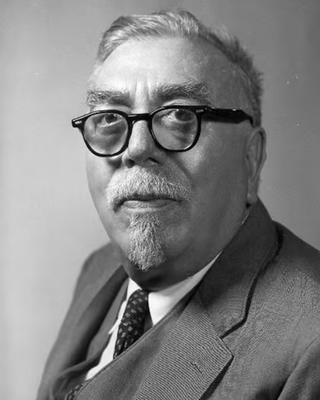
Norbert Wiener was an American computer scientist, mathematician and philosopher. He became a professor of mathematics at the Massachusetts Institute of Technology (MIT). A child prodigy, Wiener later became an early researcher in stochastic and mathematical noise processes, contributing work relevant to electronic engineering, electronic communication, and control systems.
Medical cybernetics is a branch of cybernetics which has been heavily affected by the development of the computer, which applies the concepts of cybernetics to medical research and practice. At the intersection of systems biology, systems medicine and clinical applications it covers an emerging working program for the application of systems- and communication theory, connectionism and decision theory on biomedical research and health related questions.
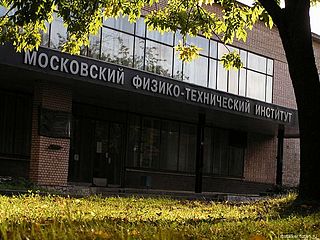
Moscow Institute of Physics and Technology, is a public research university located in Moscow Oblast, Russia. It prepares specialists in theoretical and applied physics, applied mathematics and related disciplines.
The calculus ratiocinator is a theoretical universal logical calculation framework, a concept described in the writings of Gottfried Leibniz, usually paired with his more frequently mentioned characteristica universalis, a universal conceptual language.
Second-order cybernetics, also known as the cybernetics of cybernetics, is the recursive application of cybernetics to itself and the reflexive practice of cybernetics according to such a critique. It is cybernetics where "the role of the observer is appreciated and acknowledged rather than disguised, as had become traditional in western science". Second-order cybernetics was developed between the late 1960s and mid 1970s by Heinz von Foerster and others, with key inspiration coming from Margaret Mead. Foerster referred to it as "the control of control and the communication of communication" and differentiated first-order cybernetics as "the cybernetics of observed systems" and second-order cybernetics as "the cybernetics of observing systems".
Biocybernetics is the application of cybernetics to biological science disciplines such as neurology and multicellular systems. Biocybernetics plays a major role in systems biology, seeking to integrate different levels of information to understand how biological systems function. The field of cybernetics itself has origins in biological disciplines such as neurophysiology. Biocybernetics is an abstract science and is a fundamental part of theoretical biology, based upon the principles of systemics. Biocybernetics is a psychological study that aims to understand how the human body functions as a biological system and performs complex mental functions like thought processing, motion, and maintaining homeostasis.(PsychologyDictionary.org)Within this field, many distinct qualities allow for different distinctions within the cybernetic groups such as humans and insects such as beehives and ants. Humans work together but they also have individual thoughts that allow them to act on their own, while worker bees follow the commands of the queen bee. . Although humans often work together, they can also separate from the group and think for themselves.(Gackenbach, J. 2007) A unique example of this within the human sector of biocybernetics would be in society during the colonization period, when Great Britain established their colonies in North America and Australia. Many of the traits and qualities of the mother country were inherited by the colonies, as well as niche qualities that were unique to them based on their areas like language and personality—similar vines and grasses, where the parent plant produces offshoots, spreading from the core. Once the shoots grow their roots and get separated from the mother plant, they will survive independently and be considered their plant. Society is more closely related to plants than to animals since, like plants, there is no distinct separation between parent and offspring. The branching of society is more similar to plant reproduction than to animal reproduction. Humans are a k- selected species that typically have fewer offspring that they nurture for longer periods than r -selected species. It could be argued that when Britain created colonies in regions like North America and Australia, these colonies, once they became independent, should be seen as offspring of British society. Like all children, the colonies inherited many characteristics, such as language, customs and technologies, from their parents, but still developed their own personality. This form of reproduction is most similar to the type of vegetative reproduction used by many plants, such as vines and grasses, where the parent plant produces offshoots, spreading ever further from the core. When such a shoot, once it has produced its own roots, gets separated from the mother plant, it will survive independently and define a new plant. Thus, the growth of society is more like that of plants than like that of the higher animals that we are most familiar with, there is not a clear distinction between a parent and its offspring. Superorganisms are also capable of the so-called "distributed intelligence," a system composed of individual agents with limited intelligence and information. These can pool resources to complete goals beyond the individuals' reach on their own. Similar to the concept of "Game theory." In this concept, individuals and organisms make choices based on the behaviors of the other player to deem the most profitable outcome for them as an individual rather than a group.
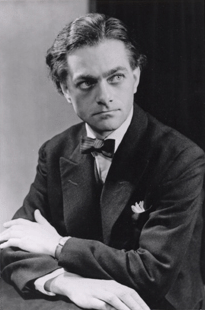
Andrew Gordon Speedie Pask was a British cybernetician, inventor and polymath who made multiple contributions to cybernetics, educational psychology, educational technology, applied epistemology, chemical computing, architecture, and systems art. During his life, he gained three doctorate degrees. He was an avid writer, with more than two hundred and fifty publications which included a variety of journal articles, books, periodicals, patents, and technical reports. He worked as an academic and researcher for a variety of educational settings, research institutes, and private stakeholders including but not limited to the University of Illinois, Concordia University, the Open University, Brunel University and the Architectural Association School of Architecture. He is known for the development of conversation theory.

Louis Hirsch Kauffman is an American mathematician, mathematical physicist, and professor of mathematics in the Department of Mathematics, Statistics, and Computer Science at the University of Illinois at Chicago. He does research in topology, knot theory, topological quantum field theory, quantum information theory, and diagrammatic and categorical mathematics. He is best known for the introduction and development of the bracket polynomial and the Kauffman polynomial.

Stuart Anspach Umpleby is an American cybernetician and professor in the Department of Management and Director of the Research Program in Social and Organizational Learning in the School of Business at the George Washington University.

The American Society for Cybernetics (ASC) is an American non-profit scholastic organization for the advancement of cybernetics as a science, a discipline, a meta-discipline and the promotion of cybernetics as basis for an interdisciplinary discourse. The society does this by developing and applying cybernetics’ concepts which are presented and published via its conferences and peer-reviewed publications. As a meta-discipline, it creates bridges between disciplines, philosophies, sciences, and arts. The ASC is a full member of the International Federation for Systems Research (IFSR).

Cybernetics is the transdisciplinary study of circular causal processes such as feedback and recursion, where the effects of a system's actions return as inputs to that system, influencing subsequent action. It is concerned with general principles that are relevant across multiple contexts, including in ecological, technological, economic, biological, cognitive and social systems and also in practical activities such as designing, learning, and managing. Cybernetics' transdisciplinary character has meant that it intersects with a number of other fields, leading to it having both wide influence and diverse interpretations.

Cliff Joslyn is an American mathematician, cognitive scientist, and cybernetician. He is the Chief Knowledge Scientist at the Pacific Northwest National Laboratory in Seattle, and visiting professor of systems science at Binghamton University.
Robert Vallée was a French cyberneticist and mathematician. He was Professor at the Paris 13 University and president of the World Organization of Systems and Cybernetics (WOSC).
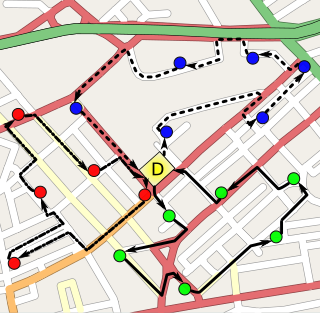
Applied mathematics is the application of mathematical methods by different fields such as physics, engineering, medicine, biology, finance, business, computer science, and industry. Thus, applied mathematics is a combination of mathematical science and specialized knowledge. The term "applied mathematics" also describes the professional specialty in which mathematicians work on practical problems by formulating and studying mathematical models.
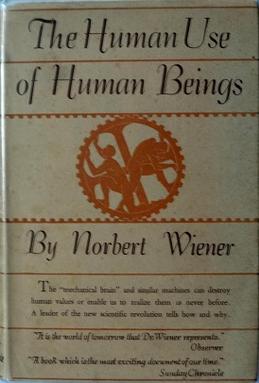
The Human Use of Human Beings is a book by Norbert Wiener, the founding thinker of cybernetics theory and an influential advocate of automation; it was first published in 1950 and revised in 1954. The text argues for the benefits of automation to society; it analyzes the meaning of productive communication and discusses ways for humans and machines to cooperate, with the potential to amplify human power and release people from the repetitive drudgery of manual labor, in favor of more creative pursuits in knowledge work and the arts. The risk that such changes might harm society is explored, and suggestions are offered on how to avoid such risk.

Cybernetics: Or Control and Communication in the Animal and the Machine is a book written by Norbert Wiener and published in 1948. It is the first public usage of the term "cybernetics" to refer to self-regulating mechanisms. The book laid the theoretical foundation for servomechanisms, automatic navigation, analog computing, artificial intelligence, neuroscience, and reliable communications.
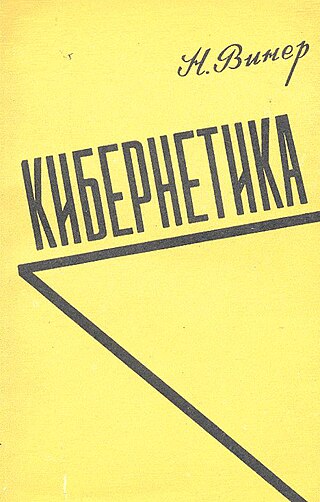
Cybernetics in the Soviet Union had its own particular characteristics, as the study of cybernetics came into contact with the dominant scientific ideologies of the Soviet Union and the nation's economic and political reforms: from the unmitigated anti-Americanist criticism of cybernetics in the early 1950s; its legitimization after Stalin's death and up to 1961; its total saturation of Soviet academia in the 1960s; and its eventual decline through the 1970s and 1980s.

Jason Jixuan Hu, is a Chinese American cyberneticist, independent scholar and managing director of WINTOP Organizational Learning Laboratory, and organizer/facilitator of the Club of Remy(Youtube Channel). He is noted for his work on "cognitive capacity in human communication, conflict resolution and cooperation solicitation," and on view on distance education in America.












